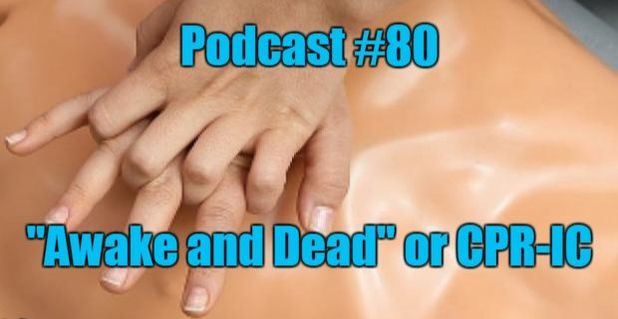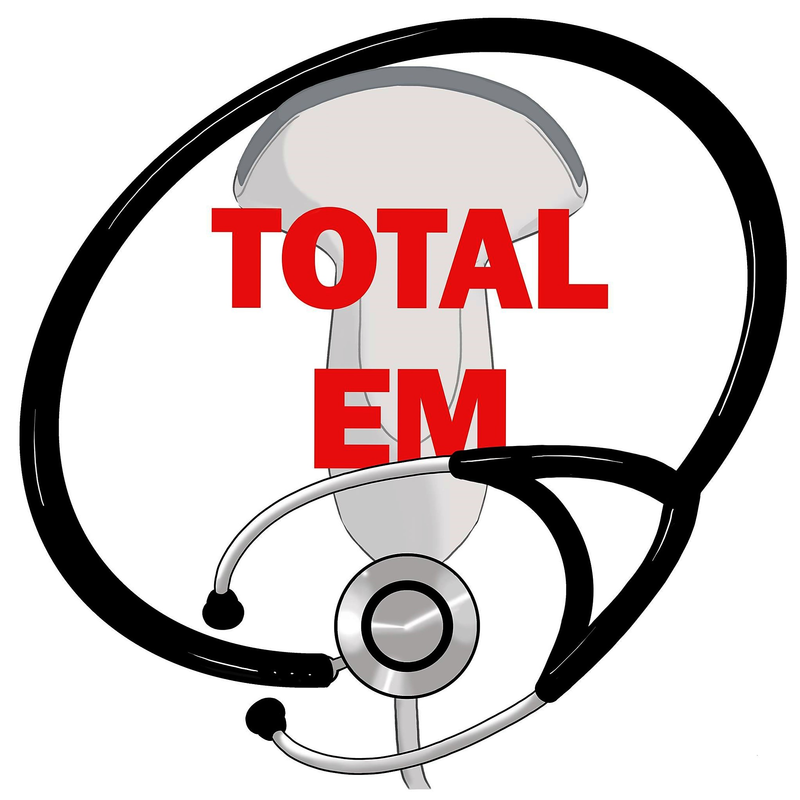|
What do you do when the dead are awake? It is confusing terminology, but patients may develop consciousness and be alert during cardiac arrest while receiving chest compressions. In the literature, this is often reported as cardiopulmonary resuscitation induced consciousness (CPR-IC) The phenomenon is overall rare but reports are increasing with time. In this blog and podcast we talk about how to manage such patients.
As we mentioned the rates of CPR-IC appear to be increasing. At one university hospital in Italy there were six cases of such events in a little over two years. It is worth noting that four out of the six achieved return of spontaneous circulation (ROSC) and all of those that did survived to discharge neurologically intact. Of those that survived the CPR was as little as 4 minutes up to 30 minutes. However, they lacked a structured approach and everything from physical restraint to analgesia or induction with fentanyl or propofol.
A prospective study from 2014 known as AWARE discussed awareness in resuscitation with 140 survivors of cardiac arrest. Of those interviewed, 55 had perceptions of awareness and/or memories. However, only one had a verifiable period of conscious awareness during which time such functions were not expected. It may be a small number, but it is still concerning. Many may still have the perceptions and we could try to help reduce some of the complications such as post-traumatic stress disorder (PTSD) that develop. In a systematic review that was published later in 2014 found 10 patients from nine reports with resuscitations lasting up to 280 minutes (4 hours and 40 minutes and survived to hospital discharge)! These patients were able to perform movements including attempts to remove endotracheal tubes. There are even cases of reported verbal communication. Some were able to interfere with the resuscitation itself. Overall, this was an important reminder to let us know that some form of guidelines should be established. An observational study published in 2017 using data from Victoria, Australia with encounters from January 2008 to December 2014 found 112 cases of CPR-IC among a listed 16,558 patients (0.67% total). Many had body movements (87.5%) but even 29.5% had speech. Interestingly, patients receiving consciousness-altering medications including midazolam, opiates, and paralytics were statistically less like to survive to hospital discharge though in general patients with CPR-IC did have better survival outcomes. However, we must remember that this is a limited study as it is retrospective in nature without randomization. When studying healthcare workers in 2016, CPR-IC was studied with a cross-sectional survey of 100 healthcare professionals that demonstrated most who completed the survey as having seen this event. Furthermore, it supported that there are many different ideas on how to approach this situation from no action to sedation and/or paralysis. Guidelines have also varied by groups but some such as the Wellington Free Ambulance in New Zealand and the State of Nebraska EMS have pushed for ketamine and midazolam. With all of this (sometimes) conflicting data, what should we do about these patients? After reviewing the current evidence, it may be most appropriate for these patients to receive ketamine with or without midazolam. Ketamine is less likely to cause some of the complications that we can see from other medications that were used and may provide some additional benefit such as providing both pain control and sedation while having catecholamine effects. Midazolam could still be beneficial since patients receiving ketamine can still sometimes have problems with PTSD or similar conditions after the resuscitation. Let us know what you think by giving us feedback here in the comments section or contacting us on Twitter or Facebook. Remember to look us up on Libsyn and on iTunes. If you have any questions you can also comment below, email at [email protected], or send a message from the page. We hope to talk to everyone again soon. Until then, continue to provide total care everywhere.
8 Comments
Fred
1/31/2018 07:16:09 pm
Have had an experience with this in the past year. It is was pretty amazing (and traumatic) having a patient interact with us and his family while CPR was being performed. (Not talking, but nodding and giving the thumbs up, looking around the room.) It lasted well over 45 minutes. It was impossible to stop CPR with a conscious patient. It took some effort but cardiology tried a cath but to no avail. Think ECMO might have helped, but it was not available.
Reply
Chip Lange, PA-C
1/31/2018 08:05:32 pm
Wow, Fred. Sounds like quite the situation. It sounds like he was more cooperative. Did you need to do anything like restraints, analgesia, sedation, or any other measures or was it even considered? The way you make it sound is that he did not survive his arrest. Is that correct? Thank you for sharing your experience.
Reply
Fred
2/1/2018 12:26:36 pm
Chip,
Chip Lange, PA-C
2/1/2018 03:14:06 pm
Fair enough, Fred. Thanks for sharing your story. Hope this podcast is helpful for future events.
G Erasmus
4/28/2018 12:52:05 am
Had a case few years back. Male mid 60’s collapse during a game of fetch with the dogs. Immediate bystander CPR. On arrival, Pt attempted to push compressor off his chest and actually interrupted compression quality. Same scenario as described in most incidents, gradual decline in consciousness once compressions halted. Off duty, Non EM doc, kept stating pt must have pulse and after short rebuttal including pause for pulse check he came around. I made the decision to intubate with Roc only. Post ROSC, Midaz/ Morphine given. Spoke to pt a few days later, no recollection of events, patchy memory of events prior to arrest.
Reply
Chip Lange, PA-C
4/29/2018 01:13:03 am
Incredible story. Thanks for sharing. There is a lot of education that has to happen and those outside of our specialties may not understand this rare phenomenon. I am glad your patient had a good outcome. Hopefully, more people will share their stories and we can start getting more research on this topic.
Reply
Leave a Reply. |
Libsyn and iTunesWe are now on Libsyn and iTunes for your listening pleasure! Archives
August 2022
Categories |
||||||


 RSS Feed
RSS Feed